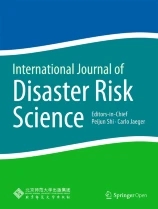Guest Editors:
Dr. Haorui Wu, School of Social Work, Dalhousie University
Dr. Christine A. Walsh, Faculty of Social Work, University of Calgary
Dr. Julie Drolet, Faculty of Social Work, University of Calgary
Dr. Kyle Breen, School of Social Work, Dalhousie University
Purpose:
Older adults, recognized as a vulnerable and marginalized group, tend to be disproportionately impacted by increasing disasters worldwide, including natural hazards (e.g., pandemics, flooding, wildfires, and extreme temperatures), technological hazards (e.g., explosion and traffic accident), and other acts of intentional violence (e.g., terrorist attacks and civil war). Specifically, during the COVID-19 pandemic, the global death toll is strongly biased toward older adults, identified as occupying the highest risk of physical health, mental wellness, and overall well-being. Conversely, in responding to pandemic-specific needs, older retired professionals (e.g., physicians, nurses, and teachers) returned to the frontline and older adults voluntarily served as caregivers for children and other family members of essential workers. Past disaster-driven research, practice, and policy have primarily focused on generalized assumptions of older adults as a vulnerable, passive, and dependent group rather than recognizing their diversity, expertise, assets, and experiences. Their strengths (e.g., life-long experience and community-based expertise) can significantly advance post-disaster (pandemic) recovery and build resilience at the individual, family, and community levels. As the world shifts into COVID-19 recovery, there is a need to connect researchers, practitioners, policy/decision-makers, and educators with evidence-based strategies and promising practices that advance older adults’ contributions to post-pandemic reconstruction and recovery.
The goal of this special issue is to inform the older adult research, practice, policy, public discourse, and education by enhancing the appreciation of older adults’ diverse strengths in disaster settings, and by connecting and building capacity among older adult-specific professionals, the general public, and other related stakeholders. The international expertise will support age-friendly research, practice, policy/decision-making, and education, and contribute to building more resilient, inclusive, and sustainable societies while reducing inequalities and vulnerabilities in COVID-19 recovery in particular and surging global disasters in general.
Interest Area for Topics:
This special issue will build a knowledge dissemination, translation, and mobilization platform to leverage international scholars’ research-practice-policy-education knowledge on the older adults’ unique and diverse strengths in the global context of climate change, disasters, and other diverse crises. All types of disasters and all disaster stages (pre-disaster preparedness, emergency response, post-disaster reconstruction and recovery, and future disaster mitigation) will be considered. This special issue aims to transcend disciplinary boundaries⎯with papers hailing from different scientific disciplines. Quantitative and qualitative approaches are welcome. Submissions from all disciplines, career stages, cultures, and places are welcome. Potential topics include, but are not limited to:
The experience and knowledge of older adults as an “asset” in disaster (pandemic) response and recovery;
Older adults’ use of unique risk communication strategies that expand beyond new forms of media;
The experiences of older adults coming out of retirement to assist in pandemic and/or disaster response; and
Disaster philanthropy and volunteerism of older adults.
The editors would like prospective authors to consider the following aspects of contributions, although this should not be regarded as an exhaustive list:
Research-Practice: To share and exchange collective knowledge and practice strategies of older-adult-specific disaster efforts, focusing on the empowerment of older adult leadership designed to enhance post-disaster (pandemic) reconstruction and recovery domestically and internationally;
Collaboration: To connect local, national, and international stakeholders and mobilize disaster-specific resources, building older adult resilience;
Policymaking Innovation: To stimulate older adult-driven policymaking by focusing on their contributions, to shift from “passive victims” to “empowered actors,” that support post-disaster recovery; and
Public Education: To educate the general public and the next generation of researchers, practitioners, and policymakers by promoting older-adult-specific disaster information exchange and knowledge mobilization.
Proposal Time Schedule:
First submission deadline: February 28, 2023
Completion of the first round of review: April 30, 2023
Revised manuscripts deadline: June 30, 2023
Completion of the second round of review: August 31, 2023
Expected publication date: October 31, 2023
Other Information:
Submission Instructions: https://www.springer.com/journal/13753/submission-guidelines
Journal Website: www.springer.com/13753
Submission Website: https://mc03.manuscriptcentral.com/ijdrs







